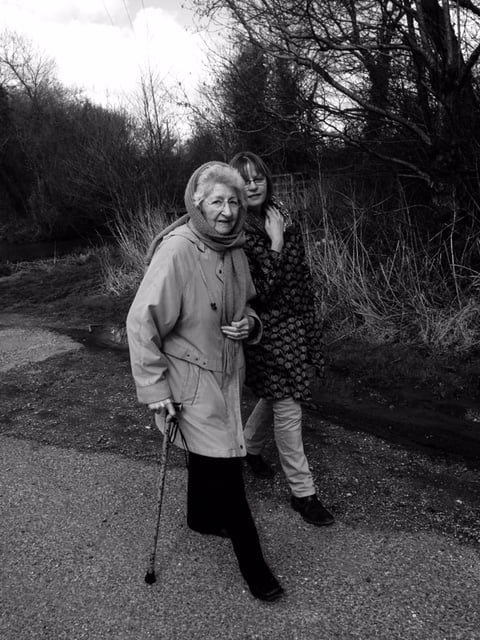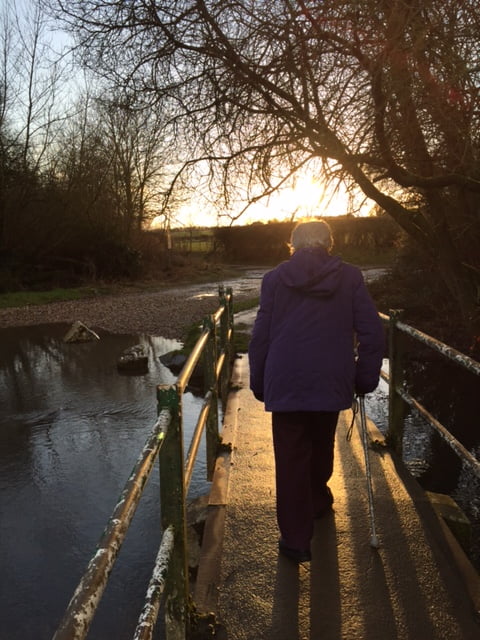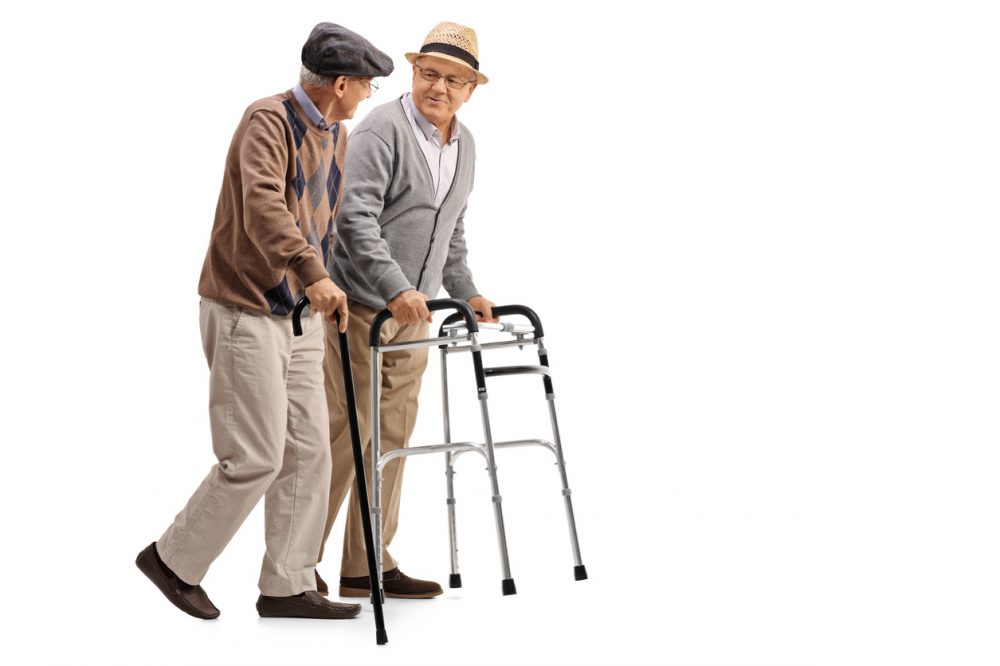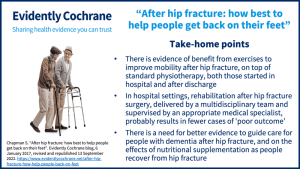Hip fracture is a really common injury in later life, but do we have reliable evidence to guide care and rehabilitation? Sarah Chapman takes a look, and also at some evidence on preventing falls – and fractures – in the first place.
Page originally published: 06 January 2017. Revised and republished: 13 September 2022, to include new evidence.
Take-home points
“Mum’s fallen and broken her hip”
These were heart-sink words I didn’t want to hear, not just for the sorrow that my parent was in for a painful, difficult time in the short-term, but knowing too that this can be an injury with serious, long-term consequences. Thankfully, as a very fit 73 year old, Mum made a good recovery, though left with a rolling gait and a permanent dent in her confidence when moving outside.

As Mum aged, I dreaded it happening again as for those who are frailer, older, the consequences can be catastrophic. There is an increased riskA way of expressing the chance of an event taking place, expressed as the number of events divided by the total number of observations or people. It can be stated as ‘the chance of falling were one in four’ (1/4 = 25%). This measure is good no matter the incidence of events i.e. common or infrequent. of death following hip fracture; for survivors, poorer physical function can lead to loss of independence. Were Mum to break her hip again, she’d be one of the 40% of people with hip fracture who also have cognitive impairment or dementia; she was also frail and under-nourished. These are all factors associated with poorer outcomesOutcomes are measures of health (for example quality of life, pain, blood sugar levels) that can be used to assess the effectiveness and safety of a treatment or other intervention (for example a drug, surgery, or exercise). In research, the outcomes considered most important are ‘primary outcomes’ and those considered less important are ‘secondary outcomes’..
People like my mum – old and frail with multiple co-morbidities, quite probably including some form of cognitive impairment – make up the majority of those with hip fracture, which is a really common injury. Most need surgery, to reduce the risk of limb deformity and to speed recovery. So what works best when it comes to care and rehabilitation after hip fracture surgery? There are a number of Cochrane reviewsCochrane Reviews are systematic reviews. In systematic reviews we search for and summarize studies that answer a specific research question (e.g. is paracetamol effective and safe for treating back pain?). The studies are identified, assessed, and summarized by using a systematic and predefined approach. They inform recommendations for healthcare and research. which bring together the best available evidence on different aspects of rehabilitation and some have informed the NICE guideline on the management of hip fracture in adults. Let’s take a look.
Improving mobility after hip fracture
This is so important for recovery, but how best to help people move as well as possible after they’ve fractured a hip? There is evidence from the Cochrane Review Interventions for improving mobility after hip fracture surgery in adults (published September 2022) that:
- Interventions aiming to improve mobility that start in hospital within a week of the hip fracture
- may moderately improve people’s mobility four months later, and probably increase their walking speed by a small but meaningful amount
- probably make little or no difference to whether someone will be readmitted to hospital, or return to living at home, or to when they will die
It’s unclear whether there’s any effect on the ability to move around and function on one’s environment, or on wellbeing.
- Interventions aiming to improve mobility that start after discharge from hospital and take place at home or in outpatient clinics
- increase walking speed by a small but meaningful amount
- probably make little or no difference to re‐admission to hospital or death, and slight increases in wellbeing are too small to be meaningful.
Both in hospital and after discharge, the evidence suggests that exercises targeting mobility, added to standard physiotherapy, help people get safely back on their feet, moving and walking again after hip fracture surgery. The most useful exercises seem to be those that work to improve walking, balance and functional tasks.
Multidisciplinary rehabilitation
Care and rehabilitation after hip fracture surgery are increasingly in the hands of a multidisciplinary team, and this was explored in a Cochrane Review Multidisciplinary rehabilitation for older people with hip fractures (published November 2021).
It has evidence that, in hospital settings, rehabilitation after hip fracture surgery delivered by a multidisciplinary team and supervised by an appropriate medical specialist, probably results in fewer cases of ‘poor outcome’. It may also reduce the number of people with poor mobility at 12 months. Its effects (if any) on other outcomes, such as long-term hip-related pain, quality of life, and activities of daily living pain, are uncertain. The impact of supported discharge and multidisciplinary home rehabilitation is also unclear.
How can we best care for people with dementia?
A Cochrane Review Enhanced rehabilitation and care models for adults with dementia following hip fracture surgery specifically looking at rehabilitation and care models for people with dementia after hip fracture surgery was last updated in February 2020. There is low-certaintyThe certainty (or quality) of evidence is the extent to which we can be confident that what the research tells us about a particular treatment effect is likely to be accurate. Concerns about factors such as bias can reduce the certainty of the evidence. Evidence may be of high certainty; moderate certainty; low certainty or very-low certainty. Cochrane has adopted the GRADE approach (Grading of Recommendations Assessment, Development and Evaluation) for assessing certainty (or quality) of evidence. Find out more here: https://training.cochrane.org/grade-approach evidence that for people with dementia enhanced care and rehabilitation following hip fracture surgery may reduce rates of postoperative delirium compared with usual care, and that compared with orthopaedic‐led management, geriatrician‐led management may lead to shorter hospital stays. Effects on other outcomes, including health-related quality of life and activities of daily living, remain uncertain. The review authors say that “determining the optimal strategies to improve outcomes for this growing populationThe group of people being studied. Populations may be defined by any characteristics e.g. where they live, age group, certain diseases. of patients should be a research priority”.

Nutritional supplementation
With many older people under-nourished at the time of breaking a hip and subsequently not eating well whilst in hospital, this is an important area to address to aid recovery. All the evidence in the Cochrane Review Nutritional supplementation for hip fracture aftercare in older people (November 2016) is of low or very low quality. The largest number of studies looked at oral multi-nutrient supplements started before or soon after surgery and suggest that these may prevent complications (such as pressure ulcers, confusion and infection) in the first year after hip fracture, but have no clear effect on mortalitydeath.
Overall, the review raises more questions than the evidence can answer, or gives hints of that interventions may be promising, such as the use of dietetic assistants to help improve intake, but that need further scrutiny in well-designed trialsClinical trials are research studies involving people who use healthcare services. They often compare a new or different treatment with the best treatment currently available. This is to test whether the new or different treatment is safe, effective and any better than what is currently used. No matter how promising a new treatment may appear during tests in a laboratory, it must go through clinical trials before its benefits and risks can really be known.. The review authors note that there is no clear evidence that those who are malnourished are more likely to benefit from multi nutrient supplementation than those who aren’t, but that this may be down to limitations of the evidence, including the use of different definitions of malnutrition in individual trials. Many trials excluded people who were likely to be the most malnourished, such as those with dementia. Let’s hope future trials address these limitations so that we can fill some of these gaps in our knowledge.
Prevention is better than cure…
As well as better evidence on how best to promote recovery after hip fracture, we need to know how to prevent falls – and fractures on falling – in the first place.
There are many commercially available hip protectors, devices worn over the hips in underwear designed to hold them (or some over clothing), with the aim of lessening the risk of breaking a hip should the wearer fall. There’s Cochrane evidenceCochrane Reviews are systematic reviews. In systematic reviews we search for and summarize studies that answer a specific research question (e.g. is paracetamol effective and safe for treating back pain?). The studies are identified, assessed, and summarized by using a systematic and predefined approach. They inform recommendations for healthcare and research. on the effects of these, which I’ve discussed in this blog – Hip protectors: can they help break your fall and not your hip?
The Cochrane Review Exercise for preventing falls in older people living in the community (January 2019) has reliable evidence that exercise programmes, especially those involving balance and functional exercises, reduce the rateThe speed or frequency of occurrence of an event, usually expressed with respect to time. For instance, a mortality rate might be the number of deaths per year, per 100,000 people. of falls and the number of people experiencing falls in older people living in the community. When reported, any associated unwanted effects were mostly non-serious. The review authors also found that Tai Chi may prevent falls. You may like to read our blog about this: Exercise prevents falls in older people – but will any type of exercise do?
For more Cochrane Reviews on preventing falls, please see the list below.

More information
NHS pages on hip fracture
Other Cochrane Reviews on preventing falls:
Interventions for preventing falls in Parkinson’s disease (June 2022) We will have a blog on this later this year
Environmental and behavioural interventions for reducing physical activity limitation and preventing falls in older people with visual impairment (September 2020)
Interventions for preventing falls in people with multiple sclerosis (November 2019)
Interventions for preventing falls in people after stroke (October 2019)
Exercise for reducing falls in people living with and beyond cancer (January 2019)
Interventions for preventing falls in older people in care facilities and hospitals (September 2018)
Join in the conversation on Twitter with @CochraneUK and @SarahChapman30 or leave a comment on the blog.
Please note, we cannot give specific medical advice and do not publish comments that link to individual pages requesting donations or to commercial sites, or appear to endorse commercial products. We welcome diverse views and encourage discussion but we ask that comments are respectful and reserve the right to not publish any we consider offensive. Cochrane UK does not fact check – or endorse – readers’ comments, including any treatments mentioned.
Sarah Chapman has nothing to disclose.




[…] Dopo una frattura del femore qual è il miglior modo per far tornare in piedi la persona affetta? Pu… […]
What I would say as an experienced nurse working in an intermediate community hospital environment is that I feel the loss of our beds will be detrimental to patients who fracture their hips. Their rehabilitation will be hampered and outcomes in the long term will prove more costly.